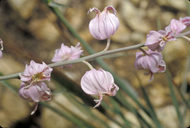Taxon Details
Streptanthus albidus ssp. peramoenus
most beautiful jewelflower
View Report Copy Link Calflora eFlora CCH CalPhotos iNaturalist
Taxon Summary:
Streptanthus albidus ssp. peramoenus, commonly known as most beautiful jewelflower, is a annual herb in the Brassicaceae that is found only in California. It occurs within Chaparral, Cismontane woodland, and Valley and foothill grassland, growing at elevations from 95 to 1000 meters. Streptanthus albidus ssp. peramoenus is ranked 1B.2, Plants Rare, Threatened or Endangered in California and Elsewhere; Moderately threatened in California.|
Scientific Name: Streptanthus albidus Greene ssp. peramoenus (Greene) Kruckeberg |
||
|
Common Name: most beautiful jewelflower |
||
| Family: | Brassicaceae | |
| Element Code: | PDBRA2G012 | |
| USDA Plants Symbol: | STALP | |
|
Synonyms/Other Names: |
||
| Name Status: |
JEF, FNA, POWO, IPNI, Tropicos |
|
| CA Rare Plant Rank: | 1B.2 |
| Fed List: | None |
| State List: | None |
| Global Rank: | G2T2 |
|
State Rank: |
S2 |
| Other Status: | BLM_S; SB_CalBG/RSABG; SB_UCBG; USFS_S |
|
CRPR Changes: changed from 1B.2 to 1B.2 on 2012-05-09 |
|
| Add Date: | 1988-01-01 |
| Date Edited: | 2024-11-05 |
| Lifeform: annual herb | ||||||||||||||
Blooming Period: (Mar)Apr-Sep(Oct)
|
||||||||||||||
|
Elevation:
95 - 1000 meters 310 - 3280 feet |
||||||||||||||
General Habitats:
|
||||||||||||||
| Microhabitat Details: | ||||||||||||||
Microhabitat:
|
||||||||||||||
|
Notes: Historical occurrences need field surveys. Threatened by development, non-native plants, and grazing. Possibly threatened by dam maintenance, road construction and maintenance, and recreational activities. Similar plants from MNT and SLO counties may be S. glandulosus ssp. glandulosus; see this name in TJM 2; further study is underway to determine its relationship to the S. glandulosus complex. See Bulletin of the Torrey Botanical Club 13(1):142 (1886) for original description, and Madroño 14(7):217-227 (1958) for taxonomic treatment. |
|
|
Threats: |
|
|
Taxonomy: |
|
| Threat List Total: | 18 | |
| Total EOs | % of EOs | |
| EOs with Threat Listed: | 53 | 51 % |
| THREAT LIST: | ||
|---|---|---|
| Non-native plant impacts | 27 | 26% |
| Grazing | 14 | 13% |
| Development | 13 | 12% |
| Road/trail construction/maint. | 12 | 11% |
| Foot traffic/trampling | 6 | 5% |
| Recreational use (non-ORV) | 5 | 4% |
| Erosion/runoff | 5 | 4% |
| Feral pigs | 4 | 3% |
| Improper burning regime | 4 | 3% |
| Other | 3 | 2% |
| Military operations | 2 | 1% |
| Mining | 1 | 0% |
| Insufficient population/stand size | 1 | 0% |
| Landfill | 1 | 0% |
| Over-collecting/poaching | 1 | 0% |
| ORV activity | 1 | 0% |
| Vandalism/dumping/litter | 1 | 0% |
| Waterway bank protection/maintenance | 1 | 0% |
| Total Occurrences: | 103 | ||||
| Element Occurrence Ranks: | |||||
|---|---|---|---|---|---|
| A | B | C | D | X | U |
| 11 | 37 | 6 | 3 | 0 | 46 |
| Occurrence Status: | |||||
|---|---|---|---|---|---|
| Historical >20 Years | 54 | ||||
| Recent <=20 Years | 49 | ||||
| Presence: | |||||
|---|---|---|---|---|---|
| Presumed Extant | 103 | ||||
| Possibly Extirpated | 0 | ||||
| Presumed Extirpated | 0 | ||||
| California Endemic: | |||||||||||||
| California Island: | |||||||||||||
|
States: Name (Code) California (CA) |
|||||||||||||
|
California Counties and Islands: Name (Code) Alameda (ALA), Contra Costa (CCA), Monterey (MNT), San Luis Obispo (SLO), Santa Clara (SCL) |
|||||||||||||
|
Quads: Name (Quad Code) Alder Peak (3512183), Atascadero (3512046), Burnett Peak (3512172), Burro Mountain (3512173), Calaveras Reservoir (3712147), Cambria (3512151)?, Cape San Martin (3512184), Chittenden (3612185), Clayton (3712188), Cone Peak (3612114), Cypress Mountain (3512058)?, Gilroy (3712115), Hayward (3712261), La Costa Valley (3712157), Las Trampas Ridge (3712271), Lopez Mtn. (3512035), Lopez Point (3612115), Los Gatos (3712128), Morgan Hill (3712126), Morro Bay North (3512047), Morro Bay South (3512037)?, Mt. Madonna (3712116), Mt. Sizer (3712125), Niles (3712158), Oakland East (3712272), Pebblestone Shut-in (3512161), Piedras Blancas (3512163)?, Port San Luis (3512027), San Leandro (3712262), San Luis Obispo (3512036), San Simeon (3512162), Santa Margarita Lake (3512034), Santa Teresa Hills (3712127) |
|||||||||||||
Notes:
|
|||||||||||||
 Presumed Extant
Presumed Extant
Click on quad for name. Hold Shift Key to use mouse scroll wheel

